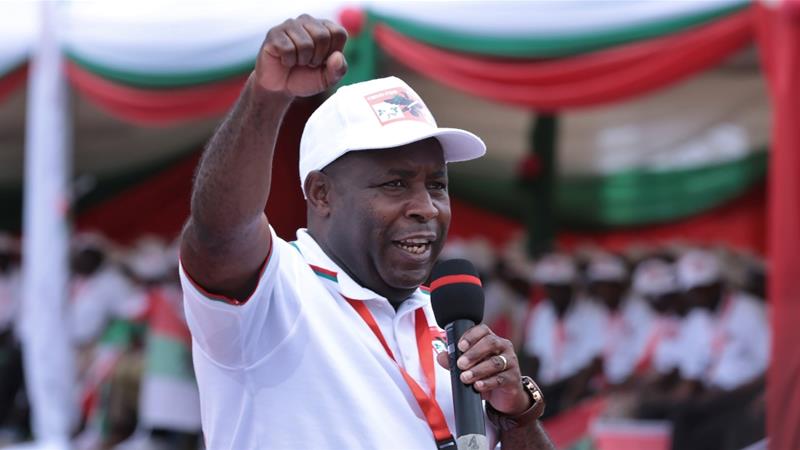
Burundi election commission says Ndayishimiye new president
The vote is meant to usher in the first democratic transfer of power in 58 years of independence.
Burundi's election commission declared the governing party's candidate, Evariste Ndayishimiye, the winner of the country's presidential election amid accusations of rigging by the leading opposition challenger.
Ndayishimiye, a retired army general, won 68.72 percent of the votes in last week's ballot, while Agathon Rwasa, the main opposition leader, received 24.19 percent, the commission said on Monday. There was a turnout of 88 percent.
Since Ndayishimiye received more than 50 percent of the vote, he avoided a runoff.
More:
Ndayishimiye was picked by the governing CNDD-FDD party to succeed outgoing President Pierre Nkurunziza, whose controversial decision to seek a third term in the last election in 2015 sparked mass unrest, violence and an opposition boycott.
Therence Manirambona, spokesman for the opposition National Freedom Council (CNL) said the party boycotted the announcement of results as it could not "back this farce", repeating allegations of "massive fraud" during Wednesday's election and the counting process.
"We have all the evidence and the real figures of these elections. We will seek justice," Manirambona told
the German news agency dpa.
Before the officials results came in, Rwasa had already alleged foul play, saying early numbers showing his CNL party heading for a bruising defeat were a "fantasy".

Burundians wait in a line to vote during the presidential and general elections in Giheta, central Burundi [AFP]
With 87.7 percent of registered voters turning out to cast their ballots in last week's elections, commission chairman Pierre Claver Kazihise described the turnout as "massive" and said the polling, which also included the election of members of parliament and local officials, was peaceful.
First democratic transfer in 58 years
The May 20 vote, which was contested by seven presidential hopefuls, is meant to usher in the first democratic transfer of power in 58 years of independence.
There were few international election monitors on Wednesday after the government said they would have to spend 14 days in quarantine to prevent the spread of the coronavirus.
Rwasa already hinted he would not take to the streets in protest and would appeal to the Constitutional Court, though he considers the process imperfect. The final election results will be declared by the Constitutional Court on June 4.
Ndayishimiye is expected to be sworn in for a seven-year term in late August, when Nkurunziza's term ends.
It is unclear whether Ndayishimiye would be able to rule free from interference by Nkurunziza, who in February was elevated by Parliament to the rank of "supreme guide for patriotism" and will remain chairman of the party's highly influential council of elders.
Burundi has been increasingly isolated since the 2015 election, when eruptions of violence left at least 1,200 dead and saw 400,000 flee the country.
Persisting turmoil has led foreign donors to cut ties, further scuttling the economy of Burundi, one of the poorest country's in the world.
Meanwhile, accusations of major human rights violations have escalated. Between January and March, Ligue Iteka, an exiled Burundian rights group, documented 67 killings, including 14 extrajudicial executions, and six disappearances.
There was no comment from the government, which has previously denied accusations of rights violations.